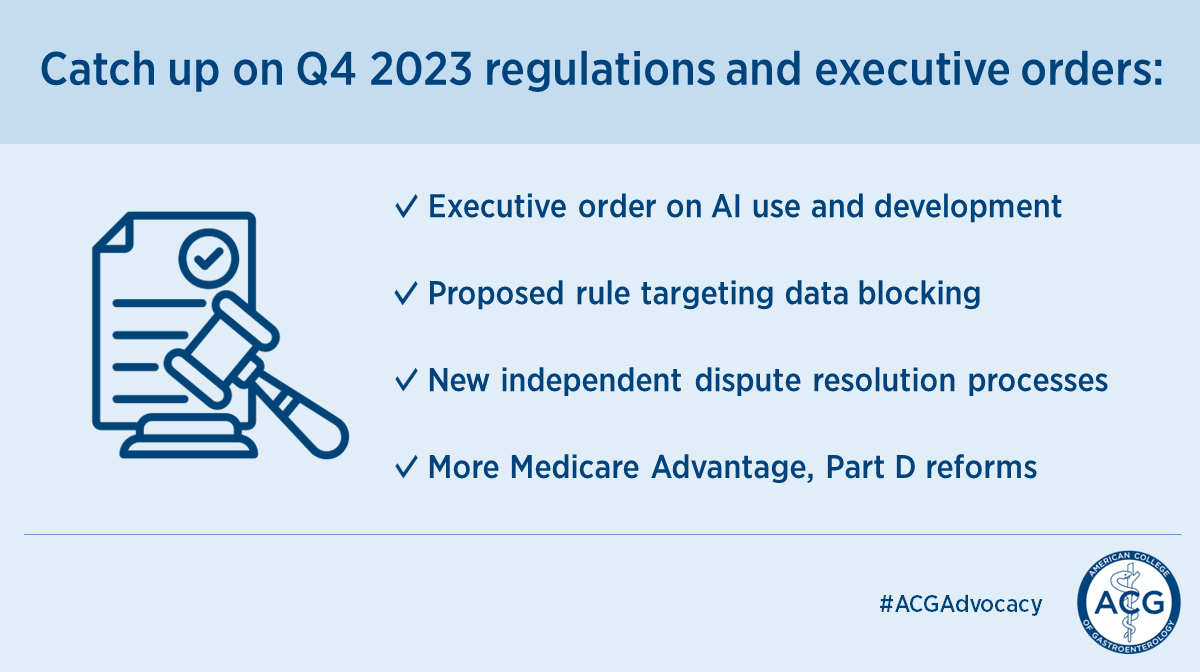
Biden issues executive order on artificial intelligence
On October 30, 2023, President Joe Biden signed an executive order entitled, Executive Order on the Safe, Secure, and Trustworthy Development and Use of Artificial Intelligence. The wide-ranging directive covers many sectors of the economy and corresponding Federal agencies from labor and workforce to national security. The Biden Administration outlines multiple overarching priorities and directives to establish broad guidance and standards as well as targeted directives for specific industries.
Key takeaways for GI practice:
- The EO creates a Health and Human Services (HHS) AI Task Force that is directed to develop strategic plan that includes policies and frameworks, possibly including regulatory action, as appropriate, on the responsible deployment and use of AI and AI-enabled technologies in the healthcare sector.
- The EO would require the Secretary of HHS to establish an AI safety program that would, in part, establish a common framework for approaches to identifying and capturing clinical errors resulting from AI deployed in healthcare settings.
Proposed rule targets data blocking with financial disincentives
On October 30, 2023, CMS and the Office of the National Coordinator for Health Information Technology (ONC) released a proposed rule on data blocking. Pursuant to the 21st Century Cures Act, HHS proposes to establish information blocking “disincentives” for healthcare providers.
Key takeaways for GI practice:
- The proposed rule highlights that the OIG has the discretion to choose which information blocking complaints to investigate.
- For ACG members participating in MIPS: a score of zero under the “Promoting Interoperability” performance category, thus decreasing the MIPS score and ultimately reimbursement
- For ACOs – inability to participate in the Medicare Shared Savings Program for at least one year.
New independent dispute resolution proposed rule
On October 27, 2022, the Departments of HHS, Labor, Treasury, and Office of Personnel Management jointly released proposed rules related to certain provisions of the No Surprises Act (NSA) and independent dispute resolution (IDR) process.
- The Departments propose to codify a definition of a “bundled payment arrangement” to clarify how certified IDR entities can identify a dispute. The Departments propose to define the term “bundled payment arrangement” as an arrangement under which multiple items or services furnished to a single patient are billed or paid under a single service code that represents multiple items or services (e.g., a Diagnosis-Related Group (DRG) code). Under current rules, bundled payment arrangements can be submitted as a single dispute and are subject to certified IDR entity fees for a single dispute rather than the higher fees for batched disputes. The Departments propose to remove language stating that a bundled payment arrangement is subject to rules for batched determinations.
- Under the proposed rule, plans and issuers would be required to provide additional information at the time of initial payment or notice of denial of payment, including the legal business name of the plan (if any) or issuer; the legal business name of the plan sponsor (if applicable); and its IDR registration number to identify the plan and issuer (which is assigned if the plan or issuer is registered with the Federal IDR registry).
More Medicare Advantage, Part D reforms proposed
On November 6, 2023, HHS released a proposed rule on Medicare Advantage (MA), Medicare Prescription Drug Benefit (Part D) contract year 2025.
Key takeaways for GI practice:
- CMS proposes to update the definition of “maintenance changes” to include a new paragraph on making any negative formulary changes to a reference product when adding a biosimilar biological product other than an interchangeable biosimilar biological product to the same or a lower cost-sharing tier and with the same or less restrictive prior authorization (PA), step therapy (ST), or quantity limits (QL) requirements.
- Currently, Part D sponsors can add a biosimilar to plan formularies but if it adds a biosimilar that is not an interchangeable biosimilar and removes the reference biological product, this is considered a non-maintenance change that requires CMS review on a case by case-by-case basis. Making such formulary changes to be classified as maintenance changes would not require extensive review by CMS. This can result in greater access to biosimilar biological products.
- CMS proposes that beginning January 1, 2025, a member of the Utilization Management (UM) committee must have expertise in health equity. CMS further proposes that the UM committee conduct an annual health equity analysis of the use of prior authorization that is approved by UM committee member with health equity expertise
The post Biden Administration Proposes New Healthcare-Related Regulations & Executive Orders appeared first on American College of Gastroenterology.